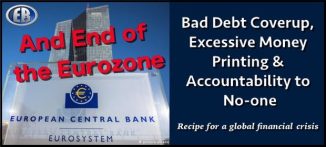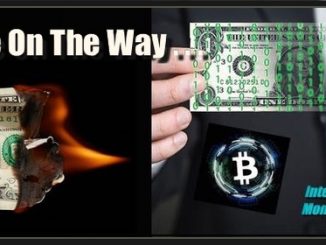
ER Editor: This article speaks to all our economies right now, not just that of the US. Although EU students are not drowning in student loan debt, except in the UK.
********
It Is Time to Remove the Debt Barrier to Economic Growth

All Global Research articles can be read in 27 languages by activating the “Translate Website” drop down menu on the top banner of our home page (Desktop version).
***
Out of habit, American economists worry about federal debt. But federal debt can be redeemed by the Federal Reserve printing the money with which to retire the bonds. The debt problem rests with individuals, companies, and state and local governments. They have no printing press.
We have explained that the indebtedness of the population means there is little discretionary income with which to drive the economy. The offshoring of middle class jobs lowered incomes, and after paying debt service—mortgage interest, car payments, credit card interest, student loan debt—Americans’ pockets are empty.
This situation has been worsened by Covid lockdowns. In the US, the federal government has sent out a few Covid payments to help keep people’s heads above water as they face expenses without income. The financial press refers to these Covid checks as “fiscal stimulus,” but there is no stimulus. The Covid checks do not come close to replacing the missing wages, salaries and business profits from lockdowns.
Corporations have indebted themselves and impaired their capitalization by borrowing money with which to repurchase their stock. This has built up their debt in the face of stagnant or declining consumer discretionary income.
We propose to deal with the debt crisis by forgiving debts as was done in ancient times. Our basic premise is that debts that cannot be paid won’t be. Widespread foreclosures and evictions would further worsen the distribution of income and wealth, and further constrain the ability of the economy to grow. Writing debt down to levels that can be serviced would clear the decks tor a real recovery. Income that would be siphoned off in debt service would instead be available to purchase new goods and services.
A few economists muttered that we were overlooking the “moral hazard” of absolving people of their debts. But leaving the economy stagnated in debt is also a moral hazard.
Policymakers did not endorse our proposal, but, in effect, policymakers adopted our policy. However, instead of forgiving the debt itself, they forgave payment of the debt service. Individuals and businesses who cannot pay their landlords or lenders cannot be evicted or foreclosed until June. This doesn’t hurt the lenders or banks because the loans are not in default, and their balance sheet is not impaired. The banks add the unpaid payments to their assets, and their balance sheets remain sound.
When June arrives, the prohibition against eviction and foreclosure will have to be extended as the accrued debt service cannot be paid. Extending the moratorium on foreclosures and evictions will just build up arrears. Is the implication a perpetual moratorium?
The question is: If policymakers are willing to forgive debt service, why not just forgive the debt? The latter is neater and clears the decks for an economic renewal.
The US economy has been financialized. Debt has been built up without a corresponding gain in productive capital investment in order to carry the mounting debt.
In financialized capitalism, the main purpose of bank loans is to refinance existing investments, not to expand productive capacity with which to service the debt.
It is not possible to grow out of debt in a financialized economy, because too much income is used for debt service. The way to deal with this problem is to write down debts.
************
Source
Michael Hudson is an American economist professor of economics at the university of Missouri Kansas City and a researcher at the Levy Economics Institute at Bard College.
Paul Craig Roberts has had careers in scholarship and academia, journalism, public service, and business. He is chairman of The Institute for Political Economy.

••••
The Liberty Beacon Project is now expanding at a near exponential rate, and for this we are grateful and excited! But we must also be practical. For 7 years we have not asked for any donations, and have built this project with our own funds as we grew. We are now experiencing ever increasing growing pains due to the large number of websites and projects we represent. So we have just installed donation buttons on our websites and ask that you consider this when you visit them. Nothing is too small. We thank you for all your support and your considerations … (TLB)
••••
Comment Policy: As a privately owned web site, we reserve the right to remove comments that contain spam, advertising, vulgarity, threats of violence, racism, or personal/abusive attacks on other users. This also applies to trolling, the use of more than one alias, or just intentional mischief. Enforcement of this policy is at the discretion of this websites administrators. Repeat offenders may be blocked or permanently banned without prior warning.
••••
Disclaimer: TLB websites contain copyrighted material the use of which has not always been specifically authorized by the copyright owner. We are making such material available to our readers under the provisions of “fair use” in an effort to advance a better understanding of political, health, economic and social issues. The material on this site is distributed without profit to those who have expressed a prior interest in receiving it for research and educational purposes. If you wish to use copyrighted material for purposes other than “fair use” you must request permission from the copyright owner.
••••
Disclaimer: The information and opinions shared are for informational purposes only including, but not limited to, text, graphics, images and other material are not intended as medical advice or instruction. Nothing mentioned is intended to be a substitute for professional medical advice, diagnosis or treatment.





Thanks for this. Yes, we are familiar with Catherine Austin Fitts.
If you’re not familiar with the “Missing $21 Tillion” (probably closer to $60T), then research Catherin Austin Fitts. This missing money has become a shadow financial system. Very close to the $28 Trillion US debt, don’t you think?
As we understand the Great Reset, yes, you are right. It doesn’t seem that Hudson and Roberts are talking within this framework, however. If you check out financial guy Charlie Ward, it seems we’re in for another type of reset, a more positive one. We’re simply watching the landscape, hoping the Schwab variety doesn’t come about. Thanks for your input.
If I’m reading this properly then whilst I agree with the concept, I believe that this debt clearing will actually occur but at the expense of handing everything you have over to the superstate. The Global Reset.